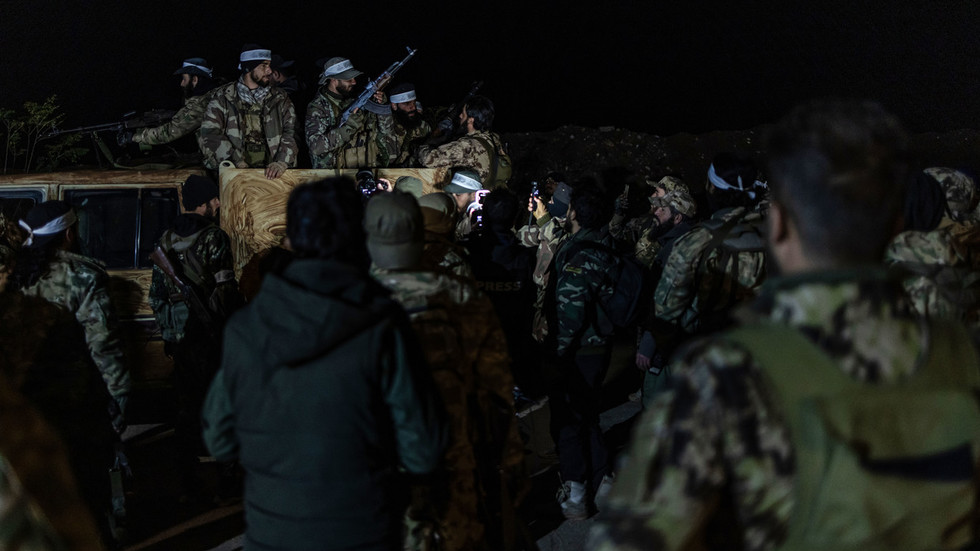In recent developments in the Syrian conflict, government forces are responding robustly to a surprising offensive launched by the jihadist group Hayat Tahrir-al-Sham (HTS) in Aleppo. HTS claimed on Friday that its fighters had infiltrated several neighborhoods of Aleppo, a city under the Syrian government’s control since 2016. Reports indicate clashes have erupted between HTS and the Syrian Army, with the jihadists boasting of territorial gains and the acquisition of military equipment. Footage posted on social media shows HTS fighters actively engaging within the city, reinforcing their claims of success. Meanwhile, the Turkish news agency Anadolu highlighted the group’s seizure of approximately 400 square kilometers across Aleppo and Idlib provinces, underscoring the significance of this operation.
In a swift reprisal, the Syrian Defense Ministry asserted that government forces have successfully regained control of several points in both Aleppo and Idlib provinces. They claimed to have inflicted substantial casualties on the HTS militants, with reports indicating heavy losses around the 400 mark. The ongoing conflict has seen HTS deploying a wide array of military resources, including heavy weapons and drones, exacerbating the violence in the region. The Syrian government has alleged the presence of foreign insurgents among the HTS ranks, suggesting international dimensions to this local battle. The ministry indicated a commitment to continue military operations until all militants are expelled from the contested areas, without yielding ground to the jihadists.
To counter the HTS advance, Russian and Syrian forces have responded with airstrikes targeting the jihadist positions, as confirmed by Syrian media outlets. Colonel Oleg Ignatiuk of the Russian military reported that these strikes have effectively killed over 400 combatants from the HTS faction in the Aleppo and Idlib regions, highlighting the scale and intensity of the ongoing military actions. The involvement of Russian airpower reflects their ongoing strategic alliance with the Syrian government in combating terrorist threats and maintaining Assad’s regime. This cooperation underscores the geopolitical complexities prevalent in Syria, particularly with external actors influencing the outcome of domestic conflict.
HTS is the latest manifestation of a group previously known as Jabhat al-Nusra, which has played a crucial role in opposing President Bashar Assad since the outbreak of the Syrian Civil War. The civil war has attracted various factions, with international interests also deeply intertwined in the conflict dynamics. Since Russia’s military intervention in 2015, the ongoing struggle for power has seen significant changes in territorial control, especially with the weakening of groups like Jabhat al-Nusra and the rise of the Islamic State. Accusations of Western involvement in supporting some rebel elements have been persistent throughout the war, indicating the multifaceted nature of the conflict and the competing narratives that persist.
Adding further complexity, former U.S. officials have labeled HTS as a significant player within the broader opposition, with some even describing it as a “strategic asset” in their efforts against Assad’s regime. HTS leadership, particularly that of Abu Mohammad al-Jolani, has attempted to rebrand the group, distancing it from its Al-Qaeda roots, and asserting that it does not pose a threat to Western interests. This presents a stark contrast to the views held by Damascus, which continues to portray the group as a critical threat, compounded by accusations of external dependencies and affiliations with more extensive terrorist networks.
As the conflict in Aleppo unfolds, the situation remains volatile and unpredictable. The strategic importance of Aleppo, both historically and in terms of military logistics, adds weight to the ongoing engagements. The attempts by HTS to regain a foothold in the city may further escalate tensions between various factions fighting for control amid a humanitarian crisis that continues to worsen. International reactions, along with Middle Eastern politics, will play a pivotal role in shaping the trajectory of this conflict, as the Syrian government, backed by Russian allies, remains intent on quelling HTS advancements and reinforcing its authority across the region. The clashes in Aleppo encapsulate the broader struggles within Syria, underscoring the persistent challenges of achieving stability and peace in the nation.

